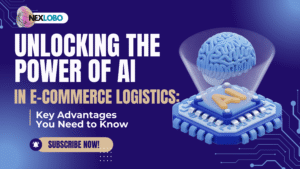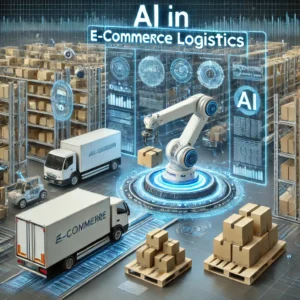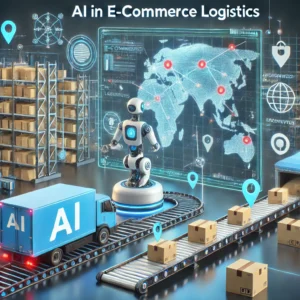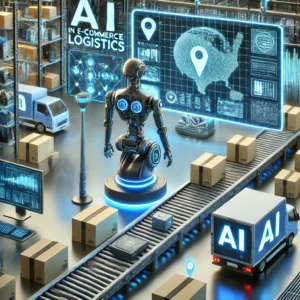AI in E-Commerce Logistics “
“
Logistics is the most important factor in e-business success in the faster moving e-commerce world. E-commerce logistics is changing through AI-powered solutions that are used to optimize supply chains and lower costs into enhancing customer experiences. This article is aimed at discussing the potential of AI to transform the e-commerce logistics industry and outlining the main advantages that this technology provides to companies.
The AI and Data as the Game-Changer in the Logistics Optimization
Artificial intelligence and data have emerged to be mandatory sources of efficiency in logistics optimization. E-commerce business generates huge data during customer interactions, purchases, real-time operations and so on. This data can be analyzed by AI in a flash to create meaningful value, enabling companies to understand how to best manage their inventory, optimize routes to deliver products, and be informed on when customers require the products.
With the help of machine learning algorithm, AI is able to look at the previous buying patterns, consumer viewing practices and market changes. Such insights enable businesses in making accurate estimations of demand and preventing overstocking or stock outs. This way, the cost of operations will be minimized and businesses will have enhanced customer experience.
A Competitive Edge With Real-Time Tracking: E-Commerce Retailers
Nowadays, in the competitive environment of e-commerce, real-time tracking is an effective tool that will increase customer satisfaction and efficiency of operations. With the AI-powered tracking systems, e-commerce retailers can keep the customers updated on their orders, point of purchase to delivery stage.
The fact that AI can collect and analyze data in a real-time manner also allows businesses to get ahead of any possible delays, divert deliveries, or any other alternative before the need to do so arises. Besides being more transparent, this builds trust and loyalty to the customers. Indeed, providing the reliable tracking data may strongly enhance the customer experience and make a retailer stand out of the crowd of its competitors.
Automation and Robotics: Enhancing Inventory:
One of the most important parts of AI in e-commerce logistics is the inventory and Artificial intelligence is taking a big part in automating and optimizing the process. Robots in warehouses, which are made to run through AI, make inventory management simple and limit the error rates made by a person which decreases labor costs. Such robots can pick, sort and pack products very fast and with great precision.
Additionally, through the use of AI-powered software, there is a greater ability to plan out the layout of a warehouse and where items are placed within the warehouse in the most efficient way possible; maximizing the space and minimizing the time it takes to retrieve the items. Such automation vastly improves throughput, such that e-commerce businesses can grow without having to proportionally increase the size of their workforce. The inventory management of AI not only enhances efficiency, but it also guarantees that the customers deliver their goods in time and with no mistakes whatsoever.

E-commerce and Developments Technology
The e-commerce market is experiencing changes as a result of technological development especially in AI. Some of the ways that AI is being incorporated into logistical processes are machine learning, predictive analytics and automation. Adoption of these technologies will enable e-commerce firms to be more efficient in their supply chains, make smart decisions that culminate in lower expenditure of operations, quicker deliveries, and customer satisfaction.
Predictive analytics is also in part a result of AI and its capacity to process volumes of data and leverage it so that e-commerce businesses can better anticipate demand, possible supply chain issues, and route delivery timetables more efficiently. This potential of utilizing actual-time information puts businesses at a competitive advantage because the business capacity enables them to act with speed and make proactive decisions that guarantee smooth and timely deliveries.
Transformations in the E-Commerce Field with AI.
Artificial intelligence is revolutionizing e-commerce through automation of repetitive duties, better decision-making, and customer gratification. E-commerce companies have the opportunities to lower business expenses, enhance product suggestions and optimize supply chain processes using AI-integrated systems. The great changes are:
- Improved Customer Tailoring: AI systems such as recommendation engines are used to understand customer activity to provide a personalized product suggestion, which is likely to generate better conversions and customer loyalty.
- More Rapid and Cost-Effective Delivery: AI streamlines shipping routes, which shortens shipments by lowering the expenses. The delivery process is further being sped up by way of automated warehouses and drones.
- Better Demand Forecasting: AI can accurately forecast customer demand, which will guarantee businesses with optimal levels of stock and keep them out of stockouts and oversupply situations.
Advantages of AI to the E-Commerce Companies
There are various advantages in terms of integrating AI in e-commerce logistics:
- Enhanced Operational Efficiency: AI eliminates human involvement since its processes such as sorting, packaging, and inventory-related processes would be mechanized. The result is the higher turnaround time and throughput.
- Cost Reduction: Automation can save a business a lot of money by cutting down labor cost, improving inventory and wastage too.
- Improved Customer Experience: Artificial intelligence introduce the possibility of real-time tracking, personalized suggestions on purchase and faster delivery options all of which positively impact customer satisfaction.
- Better Decision-Making: Artificial intelligence algorithms can feed on large bodies of information to come up with meaningful insights to assist businesses in better decision-making.
- Scaling: The ability to scale operations is enhanced by the use of AI in logistics systems so that as the order volume increases, it does not require equal proportion of operations costs as well.
Issues of AI E-Commerce Use
Despite the many advantages associated with AI, there are also some challenges in its usage that the businesses need to get over it:
- Expensive to Implement: AI may have premium costs of implementation in ensuring it is integrated in the presence systems in use, it may also need high investment infrastructure, technology and the re-training of the employees.
- Concerns of data Privacy and security: E-commerce companies deal in a lot of sensitive customer information and adoption of Artificial intelligence necessitates a stringent cyber security defense of data.
- A Complicated AI Integration: AI solutions require a technological challenge, which may not be relatively easier among businesses that are inexperienced in AI or supply-chain optimization.
Nonetheless, the rewards in the long run of AI in e-commerce logistics outbalance the start-up setbacks, and this makes it a good investment in many business operations..
Option of AI in Online-Shopping
There are several e-commerce logistic applications of AI:
- Dynamic Pricing: artificial intelligence systems dynamically set products at a given pricing depending on the demand and the price set by competitors, among other market factors.
- AI-Powered Customer Support: Chatbots and virtual assistants make it possible to have customer support 24/7, which increases client satisfaction and minimizes the number of human agents required.
- Fraud Detection: AI systems would be able to recognize abnormal trends associated with purchasing behavior to identify and prevent fraud activity that occurs in real time.
- Supply Chain Optimization: AI has the potential to study information on supply chains and anticipate bottlenecks thereby making operations smoother and increase delivery time.

What Are The Ways in Which I Can Use AI in E-Commerce?
The application of AI to the realm of e-commerce logistics must be strategic. That is how businesses can start:
- Find Key Pain Points: Be selective and look at where AI-related technology can help the most: This could be in the area of inventory, order fulfillment, or any other customer support area.
- Select the Appropriate AI Solutions: Find AI-based tools and platforms to suit your business objectives, be it predictive analytics, machine learning capabilities, or automation software.
- Train Your Staff: Make your employees trained to handle AI systems and how they can make the best use of such systems.
- Measure and Adapt: Consistent performance reviews of the AI systems and make strategies according to changing business requirements and business trends.
Conclusion
In e-commerce logistics, AI is a game-changer that offers companies with potent tools to increase operational efficiencies mitigate expenses and enhance the customer experience. AI is changing the face of how e-commerce businesses conduct their operations with real-time tracking and inventory automation, personalized recommendations, and demand forecasting among other processes. Despite the difficulty of this move, the rewards that AI could bring outweigh the hurdles hence this is a necessary technology in the future world of e-commerce.
Call to Action: When you are willing to upgrade your e-commerce logistics game by adopting AI-based approaches, go and check them out today and get a competitive advantage in this industry.
Frequently Asked Questions(FAQs)
Q1: What are the enhancements that the supply chain management of e-commerce experiences through AI?
The management of the supply chain becomes enhanced with AI forecasting demand, streamlining delivery routes and processing inventory automated, and becoming more efficient and fee-saving.
Q2: Is AI costly to apply in the e-commerce logistics?
Although the upfront cost may be high, the potential cost savings and efficiency of operations with the usage of AI is long-term, which makes it a worthy investment.
Q3: Is it possible that AI can be used to deliver customized shopping in e-commerce?
Indeed, AI is used to analyze customer information to suggest new products to meet customer needs, make the service more personalized and enable more product purchases.
Q4: What is the role of AI in minimizing delivery time during e-Commerce?
AI makes delivery routes optimized in real-time and facilitates automation in warehouses, as it accelerates the processing times and welcomes faster deliveries.
Q5: Can AI in e-commerce logistics help reduce operational costs?
A: Yes, AI in e-commerce logistics helps reduce operational costs by automating processes like inventory management, order fulfillment, and real-time tracking, minimizing the need for human intervention and optimizing resource usage.




Leave a Reply